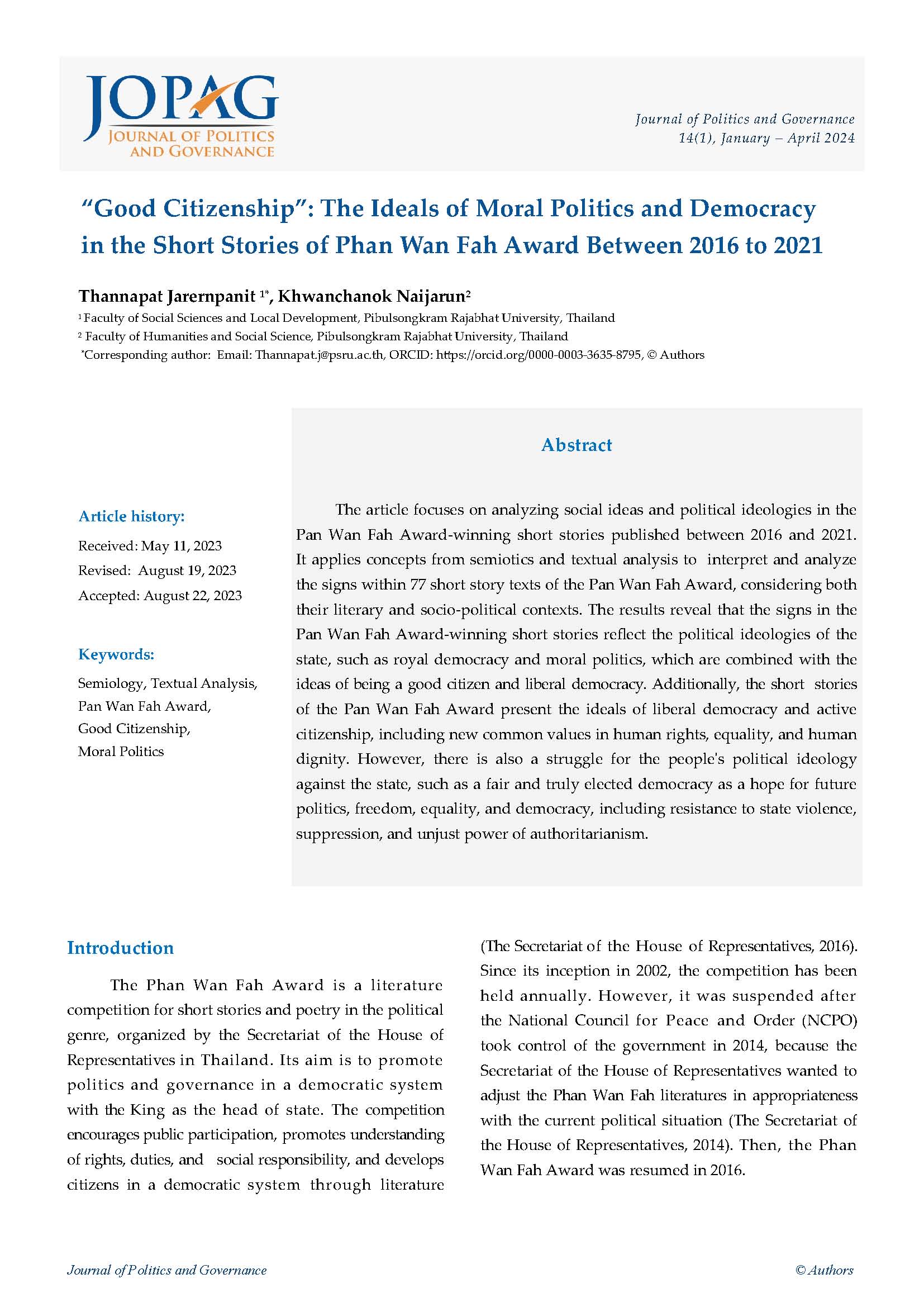“Good Citizenship”: The Ideals of Moral Politics and Democracy in the Short Stories of Phan Wan Fah Award Between 2016 to 2021
Main Article Content
Abstract
The article focuses on analyzing social ideas and political ideologies in the Pan Wan Fah Award-winning short stories published between 2016 and 2021. It applies concepts from semiotics and textual analysis to interpret and analyze the signs within 77 short story texts of the Pan Wan Fah Award, considering both their literary and socio-political contexts. The results reveal that the signs in the Pan Wan Fah Award-winning short stories reflect the political ideologies of the state, such as royal democracy and moral politics, which are combined with the ideas of being a good citizen and liberal democracy. Additionally, the short stories of the Pan Wan Fah Award present the ideals of liberal democracy and active citizenship, including new common values in human rights, equality, and human dignity. However, there is also a struggle for the people's political ideology against the state, such as a fair and truly elected democracy as a hope for future politics, freedom, equality, and democracy, including resistance to state violence, suppression, and unjust power of authoritarianism.
Article Details

This work is licensed under a Creative Commons Attribution-NonCommercial-NoDerivatives 4.0 International License.
References
Barthes, R. (1980). Elements of Semiology (Annette Lavers & Colin Smith, trans.). Hill and Wang.
Barthes, R. (1988). The semiotic challenge (Richard Howard, trans.). Basil Blackwell.
Barthes,R. (2004). Mythologies (Wannapimol Angkasirisap, trans.) (2nd ed.). Kobfai.
Barthes, R. (2008). Textual Analysis: Poe’s ‘Valdemar’. In David Lodge & Nigel Wood (Eds.), Modern Criticism and Theory: a Reader (3rd ed.) (pp.317-336). Longman.
Bobbio,N. (2006). Liberalism and Democracy (Radical Thinkers) (Martin Ryle & Kate Soper, trans.). Verso Books.
Charoensin-o-larn, C. (2002). Semiology, structuralism, post-structuralism and the study of political science. Wiphasa.
Chenvidyakarn, M. (2020). Where is Thai democracy heading?: Towards a future of liberal democracy amidst the prevailing tide of authoritarianism. King Prajadhipok's Institute Journal, 10(1), 1-16.
Gramsci, A. (1999). Selections from the Prison Notebooks (Q. Hoare & G. Nowell Smith, trans.). ElecBook.
Eco, U. (1976). A Theory of Semiotics. Indiana University Press.
Jarernpanit, T. (2018). The Moral Disintegration and the Politics of Cultural Emotions within Thailand’s Current, Deeply Divided Political Conflicts. Humanities, Arts and Social Sciences Studies, 18(3), 717-736. https://doi.org/10.14456/hasss.2018.32
Naijarun, K., & Jarernpanit, T. (2023). Phan Wan Fah Award B.E.2559 - 2564: Social Concepts and Ideological Cultivation Democratic Citizenship Through Contemporary Short Stories (Research Report). Pibulsobgkram Rajabhat University.
Saussure, F. D. (1986). Course in General Linguistics (Roy Harris, trans.). Open Court.
The Secretariat of the House of Representatives. (2023). Announcement of Pan Wan Fah Award Committee in 2023. https://www.parliament. go.th/ewtadmin/ewt/parliament_parcy/download/article/article_20230216124620.pdf
The Secretariat of the House of Representatives. (2016). Pan Wan Fah Award Literature. https://www.parliament.go.th/ewtadmin/ewt/parliament_parcy/ewt_news.php?nid=32802
The Secretariat of the House of Representatives. (2014). Announcement of Pan Wan Fah Award Committee in 2014. https://www.parliament. go.th/ewtadmin/ewt/parliament_parcy/download/article/article_20140702133230.pdf
Wantana, S. (2015). Origins and paradox of liberal democracy. Journal of Social Sciences, 45(2), 127-148.
Wenar, L. (2021). John Rawls. The Stanford Encyclopedia of Philosophy. https://plato.stanford.edu/archives/sum2021/entries/rawls/
White, E. (2012). How to Read Barthes’ Image-Music-Text. Pluto Press. https://doi.org/10.2307/j.ctt183p71d
Winichakul, T. (2016). Thailand’s Hyper-royalism: Its Past Success and Present Predicament. ISEAS Publishing.


